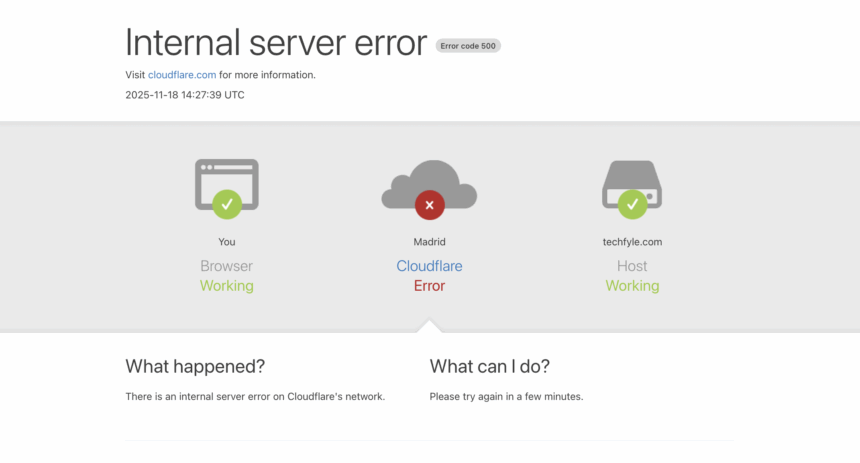The outage knocks major platforms offline, exposing the fragility of the internet’s hidden backbone.
Chaos hit the Internets today. A sudden Cloudflare outage sent error screens across leading platforms, apps, and services. People refreshed their phones. Websites refused to load. Entire workflows stalled. The issue began early in the morning and spread across systems tied to performance routing, security checks, and traffic protection.
This outage feels costly because the company sits deep inside global internet plumbing. Most people never think about it. Yet the moment Cloudflare stumbles, everything from X to OpenAI glitches, slows, or fails outright.
What’s Happening & Why This Matters
Cloudflare confirms a traffic surge triggers widespread errors
Engineers at Cloudflare reported a spike in “unusual traffic” around 11:20 a.m. GMT. The company says the surge hits one of its core services and created a chain reaction. Some requests passed normally. Many did not. Users saw 500 errors. Dashboards stopped loading. APIs returned failure messages.
A Cloudflare spokesperson explained the event with blunt urgency:
“We are all hands on deck to make sure all traffic is served without errors.”
The company is working through recovery in phases. Status updates note partial stabilization, then new error waves. Internal teams also disabled certain features, including the Warp encryption service in London. That choice blocked some users from connecting through Cloudflare-supported networks.
X, Uber, OpenAI, and other major services stumble
This outage hit many high-traffic platforms at the exact same time. Reports from Downdetector show error spikes across X, Uber, ChatGPT, Claude, DoorDash, Zoom, and Letterboxd.
OpenAI confirmed disruptions for ChatGPT, its APIs, and its video model Sora. X experienced full outages for large user segments. Uber recorded operational instability in several regions.
The pattern points to shared infrastructure congestion rather than independent failures. When Cloudflare slows, the platforms that rely on it slow too.
The internet’s dependency becomes obvious
Researchers describe Cloudflare as “the biggest company you’ve never heard of.” The firm protects websites from attacks, validates user traffic, balances load, and helps apps reach global audiences. It sits between users and servers.
Prof. Alan Woodward from the Surrey Centre for Cyber Security puts it plainly:
“When one of these companies fails, it becomes really obvious quickly.”
The outage indicates how few companies act as the internet’s gatekeepers. Amazon, Cloudflare, Fastly, and Akamai power enormous portions of the web. A glitch in any one of them ripples across thousands of services, simultaneously.
TF Summary: What’s Next
Cloudflare’s event is causing global platforms to rethink redundancy plans. The internet is more centralized each year, and outages like this remind everyone how quickly that structure enters crisis. Engineers and architects need new safeguards. Security teams need to study the unexpected traffic patterns. Users want more transparency.
MY FORECAST: Cloudflare’s outage fuels the ongoing conversation about infrastructure resilience. Companies must explore multi-provider routing, smarter failover paths, and more robust stress testing. The heat is on as AI workloads, streaming traffic, and authentication systems draw heavier dependency on quiet backbone providers.
— Text-to-Speech (TTS) provided by gspeech


